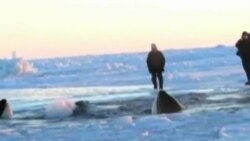A pod of killer whales trapped in the ice of Canada’s Hudson Bay successfully has left the small opening where they were gasping for breath, but marine specialists say global warming could cause more incidents like this.
Lyne Morissette, a marine researcher with the St. Lawrence Global Observatory in Quebec, said the 12 orcas may simply have gotten lost while hunting for seals and other food, but it’s more likely they got stuck in the ice because of climate change.
“They tend to base their migration on temperature, but based on the fact that temperature is changing in the Arctic, and the water is warmer, maybe they didn’t get the signal,” she said.
The mammals’ plight captivated the world after video taken by Inuit residents of the the Inukjuak community circulated on television and social media, showing the killer whales taking turns bobbing above the Bay’s icy waters.
Thousands of supporters offered money and equipment to free the whales, and news of their escape Thursday - two days after they were spotted - spurred celebrations online. But unlike in the movies about whale rescues, this story doesn’t have a soaring soundtrack or happy ending.
“They are probably close to 1,000 kilometers south of where they should be. So they still have ice to struggle with to really be at the safe place,” Morissette said. “It’s not the end of the story, because they have to get out of the Hudson Bay.”
Global warming?
The Arctic is warming about twice as fast as the rest of the planet, with temperatures rising about two degrees centigrade since 1950, according to the National Snow and Ice Data Center at the University of Colorado.
“The warming temperatures are making highly unpredictable the pattern of ice formation,” said Peter Ewins of the World Wildlife Fund Canada. “What used to be much more predictable and routine is now unpredictable, and that’s what leads to these great uncertainties and risks.”
Ewins pointed to both the whales getting stuck, and a separate incident this week in which a rescue helicopter broke through the ice in another area of the Hudson Bay.
“The lessons you’ve learned, whether you’re wildlife or human, don’t apply. You’ve got a radically different, changing system. Those tools and experiences are actually not relevant anymore,” he said.
Ted Scambos, a lead scientist with the National Snow and Ice Data Center, agreed the Arctic is changing and said greenhouse gases in the atmosphere are a major cause of this warming.
But he said he doubts this week’s events are directly linked to global warming or changes in the sea ice, which has declined in extent by three percent per decade for the last few decades in winter. In summer, that rate is more like 13 percent.
“I think winds and ice conspired to corral and then constrict this pod of killer whales and then the winds shifted before people had to take action and allowed the killer whales to get out,” Scambos said.
“That sort of stuff must have happened over and over again in history,” he said. “And some whales were lucky and some whales weren’t.”
Survival of the fittest
Whether it was global warming or shifting winds and tides that trapped the orcas, both Scambos and Ewins agreed the mammals are facing a basic test of the survival of the fittest.
While the pod that got trapped may be a weaker link, it is showing signs of remarkable intelligence, Morissette said.
“It’s amazing to see how they managed to find a strategy to share that little space and organize who’s going to breathe and when, because they all needed to breathe every five minutes and they found the strategy for the survival of the group and not the survival of the strongest.”
Morissette said the orcas may try to figure out a way to spend the winter in the Bay if they can find enough breaks in the ice to keep breathing. The greatest threat they’re facing, she noted, is exhaustion or drowning.
Ewins said man could help by pumping bubbles into the water, creating an open area. But, using a medical analogy, he said that would be like putting a Band-Aid on the bigger problem of climate change.
”The best, most effective longterm thing to do is to stop the person from having the accident or getting into the hospital in the first place,” he said. “That’s analogous to weaning ourselves off fossil fuels while we still have a chance, so our kids don’t have to deal with these things in an expensive or tragic way.”





